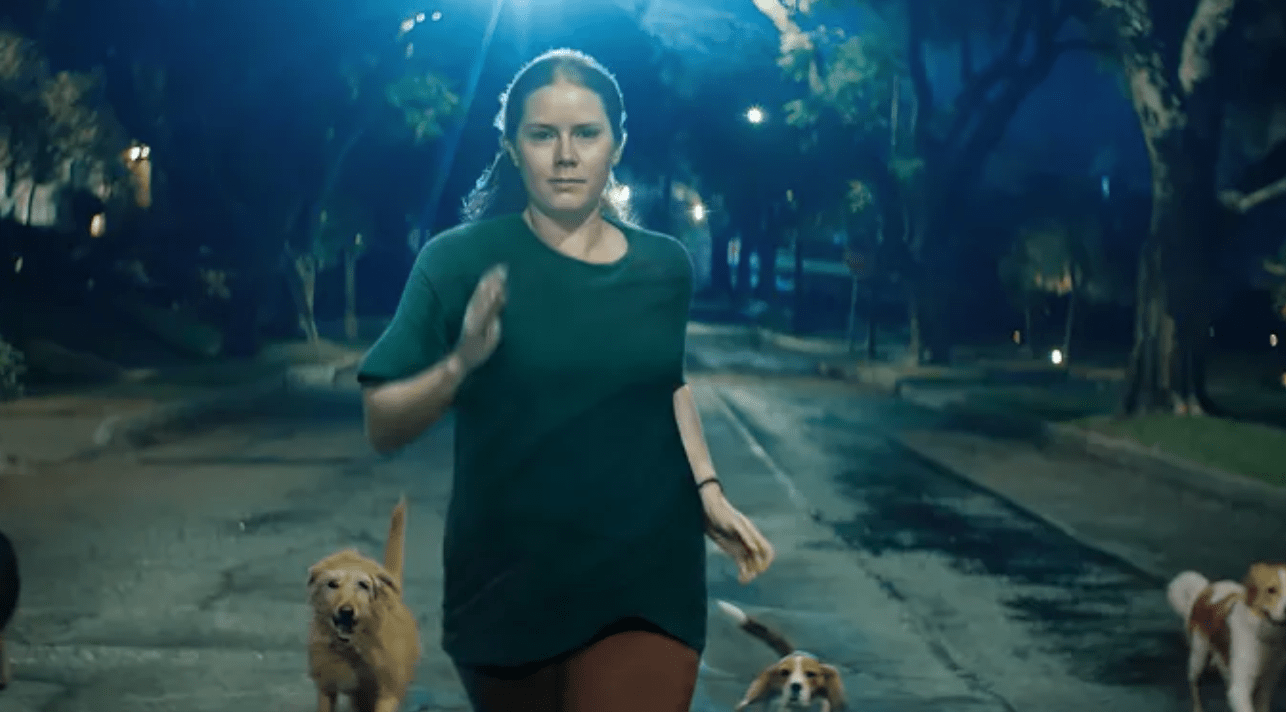Ten years ago, Jennifer Kent’s “The Babadook” opened a vein by exposing the dark side of motherhood from the mother’s perspective. In its wake, films expressing ambivalence — or even outright hostility — about childbearing have gone from taboo to a subgenre unto themselves. “Nightbitch,” based on the novel of the same name by Rachel Yoder, is very much part of this nascent tradition.
The premise is pure midnight movie: An unnamed woman (Amy Adams), who’s paused her career as an artist for the stay-at-home suburban mom life she thought she wanted for herself, starts experiencing strange symptoms. First, a patch of fur appears on her lower back; then, she grows a tail. Neighborhood dogs start coming up to her at the playground and showing up on her porch, beckoning her out into the night. Transformation is imminent.
But Marielle Heller’s version of the story — Yoder is listed as a co-writer — could have taken the magical realist element out entirely, and the film would have played exactly the same. The body horror is downplayed to the point of being functionally nonexistent: Adams changes into a dog offscreen, and she declines to feast on raw meat like her character does in the book. Instead, the emphasis here is on the literal blood and guts of biological motherhood, no movie monsters required.
This doesn’t hurt “Nightbitch,” which has many of the common pitfalls seen in films that adapt novels for the screen but isn’t the disaster it could have been if the horror was mishandled rather than minimized. Adams narrates much of the film in voiceover, but there’s only so much internal monologuing that can be translated from page to screen without grinding the movie to a halt. As a result, there are characters and plot threads — “Mother’s” relationship with librarian Norma (Jessica Harper), for example — whose significance was probably clearer in the book. In the film, they feel scattershot, gesturing at a richness that’s been sacrificed in the name of narrative efficiency.
That’s ironic given the theme of “Nightbitch,” which is all about the things that women are expected to give up in order to become mothers, and the psychic damage that results when a fully-formed adult with talents and ambitions and interests is reduced to an infantilized “mommy” figure. One of the threads that’s only partially teased out in Heller’s film is a series of flashbacks illuminating “Mother’s” childhood in a conservative religious community, and what her own mother (Kerry O’Malley) gave up to have her. The through line here is poignant, but “Mother’s Mother” (“Grandmother?”) is a cipher defined by her sacrifices and nurturing nature — the exact thing this movie is raging against.
One aspect of “Nighbitch” the film that translates successfully is “Mother’s” frustration with her clueless, also-unnamed “Husband” (Scoot McNairy), who’s away traveling on business so often that “Mother” is practically a single parent. In this case, underdevelopment suits the character, who’s bewildered when he’s asked to “babysit” and needs some mothering of his own in order to pull off simple tasks like giving his son a bath. This movie needs a safe target for its anger, and while he’s not a complete caricature — no one in this movie is — “Husband” fills that role just fine.
Two parallel groups of friends — one, “Mother’s” pretentious childfree acquaintances from college; the other, a gaggle of friendly moms who also attend Baby Book Time at the local library — also function mostly as vehicles for “Mother’s” quippy observations, which makes “Mother” herself the only fully realized person in this film. Adams can handle it, though. Her exhaustion and mixed feelings are completely believable, and her subsequent mental and physical breakdown is grounded in an emotional truth that makes it understandable, if a little weird, when she starts growling like a dog and digging in the garden with her bare hands. (Her sense of smell also improves drastically, a real-life phenomenon that happens during pregnancy and probably also ties the whole mom/dog thing together more substantially in the book.)
The most interesting aspect of Adams’ performance, however, is the clear joy she takes in spending time with her two-year-old “Son,” played here by twins Arleigh Patrick and Emmett James Snowden. They walk around together, play “dogs” together, read books and go to the park together. And while he makes basic tasks annoyingly difficult, “Mother” loves her child and does not regret having him. The problem is society’s undervaluing of women, not motherhood itself.
This adds welcome emotional complexity to the film, and tees it up for a closing monologue about the animalistic violence of childbirth that transcends the sometimes-trite mom humor of the first half and lands on something profound. Your bones are made of your mother’s bones. You came into this world through blood and pain, and every good and bad thing you’ve experienced since then is a consequence of that primal act. It’s the moment where Heller’s talent for emotionally walloping her audience finally emerges, uncut and glorious — a little late, perhaps, but a skillful backflip nonetheless.
Grade: B-
“Nightbitch” premiered at the 2024 Toronto International Film Festival. Searchlight Pictures will release it in theaters on Friday, December 6.
Want to stay up to date on IndieWire’s film reviews and critical thoughts? Subscribe here to our newly launched newsletter, In Review by David Ehrlich, in which our Chief Film Critic and Head Reviews Editor rounds up the best reviews, streaming picks, and offers some new musings, all only available to subscribers.


